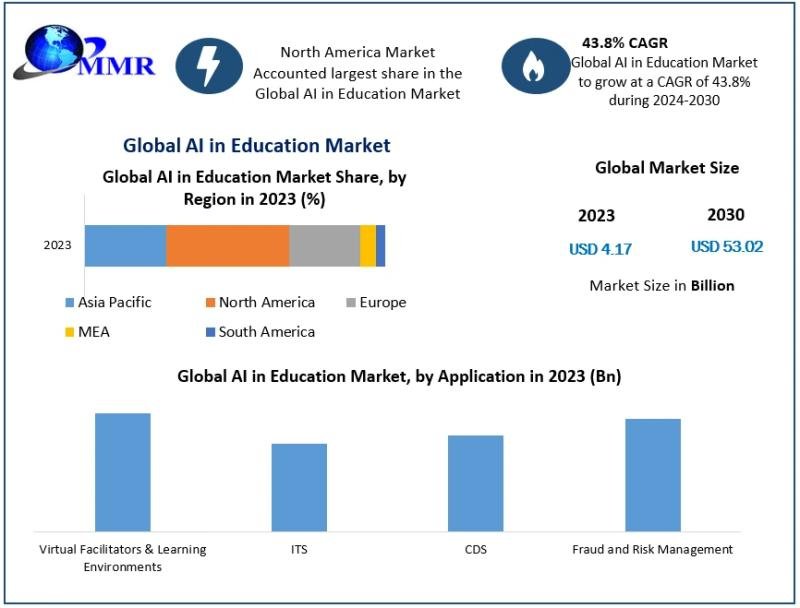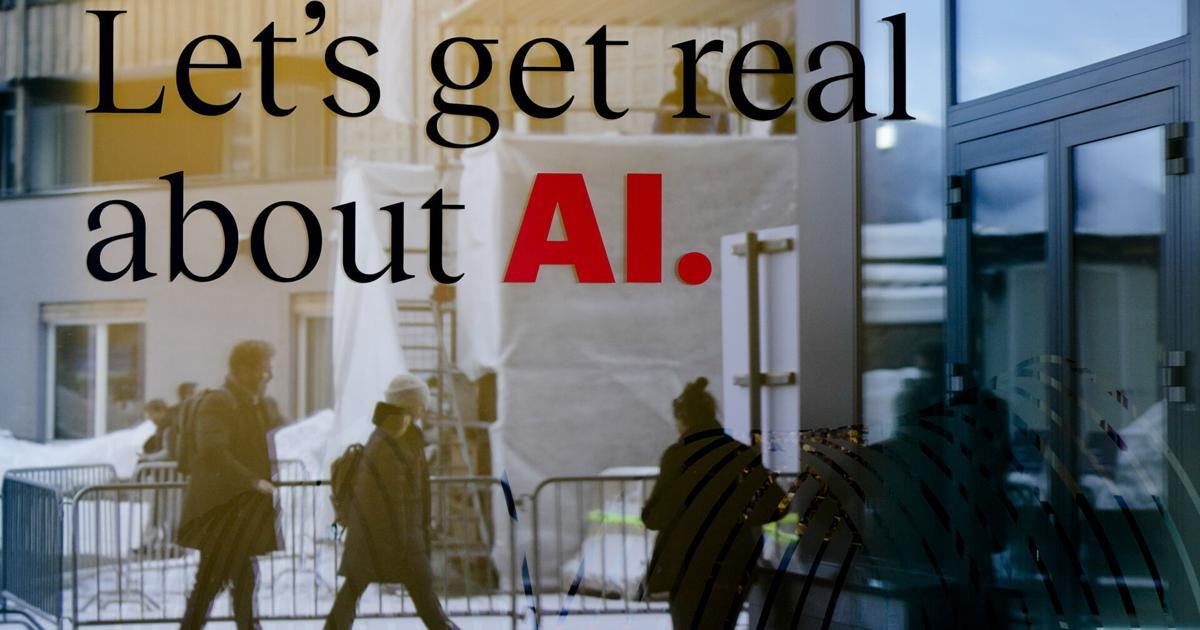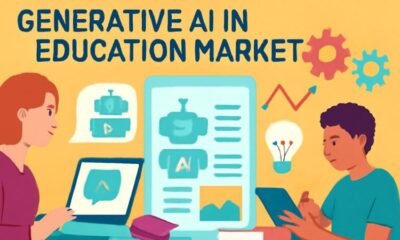Education
Global AI in Education Market Set to Soar from USD 4.17 Billion

◉ Opening Paragraph
According to a new report by Maximize Market Research, the global AI in Education Market was valued at USD 4.17 billion in 2023 and is projected to reach USD 53.02 billion by 2030, expanding at an impressive CAGR of 43.8% over the period 2024-2030. This surge is driven by the rising application of AI technologies such as deep learning, natural language processing (NLP), and virtual learning environments across educational systems worldwide.
Download your sample copy of this report today! https://www.maximizemarketresearch.com/request-sample/63174/
◉ Key Highlights
Market Size & CAGR: Valued at USD 4.17 billion in 2023, expected to reach USD 53.02 billion by 2030; CAGR of 43.8% from 2024 to 2030.
Leading Application/Segment: Virtual Facilitators & Learning Environments dominate applications, enabling interactive, personalized, and simulation-based learning.
Fastest-Growing or Largest Regional Market: North America currently commands the largest share and is expected to maintain strong growth; Asia-Pacific to emerge as the fastest-growing region.
Key Drivers and Trends: Growth driven by demand for intelligent adaptive learning (IAL), digital content synthesis, conversational learning, cloud-based deployments lowering total ownership cost, and institutional partnerships. Restraints include slower digitization in emerging economies.
Top Companies: Key players include IBM, Microsoft, Google, AWS, Pearson, DreamBox Learning, Cognizant, Liulishuo, Blackboard, Carnegie Learning, and others.
Secure your sample copy of this report immediately!https://www.maximizemarketresearch.com/request-sample/63174/
◉ Market Outlook
The AI in education market is poised for dramatic expansion through 2030. With a global valuation jumping from USD 4.17 billion in 2023 to USD 53.02 billion by 2030, the 43.8% CAGR reflects widespread adoption of AI-enabled tools across academia and EdTech. Deployment models indicate a shift toward cloud infrastructure, which offers scalability, cost-efficiency, and infrastructure modernization, especially appealing to institutions with limited resources.
Solutions and services segments are both witnessing high traction, with Services growing at a faster pace, fueled by increased government funding and technology evolution. On the technology front, NLP is anticipated to outpace traditional deep learning and ML applications, owing to the demand for virtual assistants, multilingual support, automated assessment, and content interpretation.
◉ Regional Insights
North America holds the largest current share, supported by strong educational infrastructure, institutional EdTech investments, and presence of major tech companies such as Microsoft, Google, and IBM. It is expected to sustain robust market expansion.
Asia-Pacific is projected to grow at the fastest rate, owing to increased use of educational devices, rising adoption of AI solutions in schools and colleges, and growing interest in personalized learning. However, varying levels of digitization across countries may influence adoption pace.
◉ Key Players
Leading market participants include prominent tech firms like IBM, Microsoft, Google, AWS, and education-focused EdTech companies such as DreamBox Learning, Pearson, Cognizant, Carnegie Learning, Liulishuo, and Blackboard. These players are driving innovation through NLP-based tools, intelligent tutoring systems, and virtual facilitator platforms.
To learn more about the findings of this research, please check:https://www.maximizemarketresearch.com/market-report/global-ai-in-education-market/63174/
◉ Analyst Quote
“The AI in education market represents one of the fastest-growing segments in EdTech,” said a lead analyst at Maximize Market Research. “With a CAGR of 43.8%, AI-powered solutions-from adaptive learning platforms to conversational assistants-are transforming how knowledge is delivered and assessed. The shift toward cloud-based deployment and the rise of NLP-centric technologies signal a new era for personalized, scalable education.”
◉ Get Market Research Latest Trends
Global Ceramic Single Layer Capacitor Market https://www.maximizemarketresearch.com/market-report/global-ceramic-single-layer-capacitor-market/66900/
Global Digital Transistor Market https://www.maximizemarketresearch.com/market-report/global-digital-transistor-market/76774/
Global Radio Frequency Coaxial Connector Market https://www.maximizemarketresearch.com/market-report/global-radio-frequency-coaxial-connector-market/102895/
Loudspeaker Subwoofer Market https://www.maximizemarketresearch.com/market-report/loudspeaker-subwoofer-market/148089/
Autonomous Robot Toys Market https://www.maximizemarketresearch.com/market-report/autonomous-robot-toys-market/147254/
Global Carbon Monoxide (Co) Detector Market https://www.maximizemarketresearch.com/market-report/global-carbon-monoxide-co-detector-market/70118/
◉ Contact Maximize Market Research:
3rd Floor, Navale IT Park, Phase 2
Pune Banglore Highway, Narhe,
Pune, Maharashtra 411041, India
sales@maximizemarketresearch.com
+91 96071 95908, +91 9607365656
◉ About Maximize Market Research:
Maximize Market Research is a multifaceted market research and consulting company with professionals from several industries. Some of the industries we cover include medical devices, pharmaceutical manufacturers, science and engineering, electronic components, industrial equipment, technology and communication, cars and automobiles, chemical products and substances, general merchandise, beverages, personal care, and automated systems. To mention a few, we provide market-verified industry estimations, technical trend analysis, crucial market research, strategic advice, competition analysis, production and demand analysis, and client impact studies.
This release was published on openPR.
Education
SDOC talks AI in schools – upstatetoday.com

SDOC talks AI in schools upstatetoday.com
Source link
Education
As AI tools reshape education, schools struggle with how to draw the line on cheating – Bluefield Daily Telegraph

As AI tools reshape education, schools struggle with how to draw the line on cheating Bluefield Daily Telegraph
Source link
Education
As AI tools reshape education, schools struggle with how to draw the line on cheating

The book report is now a thing of the past. Take-home tests and essays are becoming obsolete.
High school and college educators around the country say student use of artificial intelligence has become so prevalent that to assign writing outside of the classroom is like asking students to cheat.
“The cheating is off the charts. It’s the worst I’ve seen in my entire career,” says Casey Cuny, who has taught English for 23 years. Educators are no longer wondering if students will outsource schoolwork to AI chatbots. “Anything you send home, you have to assume is being AI’ed.”
The question now is how schools can adapt, because many of the teaching and assessment tools that have been used for generations are no longer effective. As AI technology rapidly improves and becomes more entwined with daily life, it is transforming how students learn and study, how teachers teach, and it’s creating new confusion over what constitutes academic dishonesty.
“We have to ask ourselves, what is cheating?” says Cuny, a 2024 recipient of California’s Teacher of the Year award. “Because I think the lines are getting blurred.”
Cuny’s students at Valencia High School in southern California now do most writing in class. He monitors student laptop screens from his desktop, using software that lets him “lock down” their screens or block access to certain sites. He’s also integrating AI into his lessons and teaching students how to use AI as a study aid “to get kids learning with AI instead of cheating with AI.”
In rural Oregon, high school teacher Kelly Gibson has made a similar shift to in-class writing. She is also incorporating more verbal assessments to have students talk through their understanding of assigned reading.
“I used to give a writing prompt and say, ‘In two weeks I want a five-paragraph essay,’” says Gibson. “These days, I can’t do that. That’s almost begging teenagers to cheat.”
Take, for example, a once typical high school English assignment: Write an essay that explains the relevance of social class in “The Great Gatsby.” Many students say their first instinct is now to ask ChatGPT for help “brainstorming.” Within seconds, ChatGPT yields a list of essay ideas, plus examples and quotes to back them up. The chatbot ends by asking if it can do more: “Would you like help writing any part of the essay? I can help you draft an introduction or outline a paragraph!”
Students say they often turn to AI with good intentions for things like research, editing or help reading difficult texts. But AI offers unprecedented temptation and it’s sometimes hard to know where to draw the line.
College sophomore Lily Brown, a psychology major at an East Coast liberal arts school, relies on ChatGPT to help outline essays because she struggles putting the pieces together herself. ChatGPT also helped her through a freshman philosophy class, where assigned reading “felt like a different language” until she read AI summaries of the texts.
“Sometimes I feel bad using ChatGPT to summarize reading, because I wonder is this cheating? Is helping me form outlines cheating? If I write an essay in my own words and ask how to improve it, or when it starts to edit my essay, is that cheating?”
Her class syllabi say things like: “Don’t use AI to write essays and to form thoughts,” she says, but that leaves a lot of grey area. Students say they often shy away from asking teachers for clarity because admitting to any AI use could flag them as a cheater.
Schools tend to leave AI policies to teachers, which often means that rules vary widely within the same school. Some educators, for example, welcome the use of Grammarly.com, an AI-powered writing assistant, to check grammar. Others forbid it, noting the tool also offers to rewrite sentences.
“Whether you can use AI or not, depends on each classroom. That can get confusing,” says Valencia 11th grader Jolie Lahey, who credits Cuny with teaching her sophomore English class a variety of AI skills like how to upload study guides to ChatGPT and have the chatbot quiz them and then explain problems they got wrong.
But this year, her teachers have strict “No AI” policies. “It’s such a helpful tool. And if we’re not allowed to use it that just doesn’t make sense,” Lahey says. “It feels outdated.”
Many schools initially banned use of AI after ChatGPT launched in late 2022. But views on the role of artificial intelligence in education have shifted dramatically. The term “AI literacy” has become a buzzword of the back-to-school season, with a focus on how to balance the strengths of AI with its risks and challenges.
Over the summer, several colleges and universities convened their AI task forces to draft more detailed guidelines or provide faculty with new instructions.
The University of California, Berkeley emailed all faculty new AI guidance that instructs them to “include a clear statement on their syllabus about course expectations” around AI use. The guidance offered language for three sample syllabus statements — for courses that require AI, ban AI in and out of class, or allow some AI use.
“In the absence of such a statement, students may be more likely to use these technologies inappropriately,” the email said, stressing that AI is “creating new confusion about what might constitute legitimate methods for completing student work.”
At Carnegie Mellon University there has been a huge uptick in academic responsibility violations due to AI but often students aren’t aware they’ve done anything wrong, says Rebekah Fitzsimmons, chair of the AI faculty advising committee at the university’s Heinz College of Information Systems and Public Policy.
For example, one English language learner wrote an assignment in his native language and used DeepL, an AI-powered translation tool, to translate his work to English but didn’t realize the platform also altered his language, which was flagged by an AI detector.
Enforcing academic integrity policies has been complicated by AI, which is hard to detect and even harder to prove, said Fitzsimmons. Faculty are allowed flexibility when they believe a student has unintentionally crossed a line but are now more hesitant to point out violations because they don’t want to accuse students unfairly, and students are worried that if they are falsely accused there is no way to prove their innocence.
Over the summer, Fitzsimmons helped draft detailed new guidelines for students and faculty that strive to create more clarity. Faculty have been told that a blanket ban on AI “is not a viable policy” unless instructors make changes to the way they teach and assess students. A lot of faculty are doing away with take-home exams. Some have returned to pen and paper tests in class, she said, and others have moved to “flipped classrooms,” where homework is done in class.
Emily DeJeu, who teaches communication courses at Carnegie Mellon’s business school, has eliminated writing assignments as homework and replaced them with in-class quizzes done on laptops in “a lockdown browser” that blocks students from leaving the quiz screen.
“To expect an 18-year-old to exercise great discipline is unreasonable, that’s why it’s up to instructors to put up guardrails.”
___
The Associated Press’ education coverage receives financial support from multiple private foundations. AP is solely responsible for all content. Find AP’s standards for working with philanthropies, a list of supporters and funded coverage areas at AP.org.
-

 Business2 weeks ago
Business2 weeks agoThe Guardian view on Trump and the Fed: independence is no substitute for accountability | Editorial
-
Tools & Platforms1 month ago
Building Trust in Military AI Starts with Opening the Black Box – War on the Rocks
-

 Ethics & Policy2 months ago
Ethics & Policy2 months agoSDAIA Supports Saudi Arabia’s Leadership in Shaping Global AI Ethics, Policy, and Research – وكالة الأنباء السعودية
-

 Events & Conferences4 months ago
Events & Conferences4 months agoJourney to 1000 models: Scaling Instagram’s recommendation system
-

 Jobs & Careers2 months ago
Jobs & Careers2 months agoMumbai-based Perplexity Alternative Has 60k+ Users Without Funding
-

 Podcasts & Talks2 months ago
Podcasts & Talks2 months agoHappy 4th of July! 🎆 Made with Veo 3 in Gemini
-

 Education2 months ago
Education2 months agoMacron says UK and France have duty to tackle illegal migration ‘with humanity, solidarity and firmness’ – UK politics live | Politics
-

 Education2 months ago
Education2 months agoVEX Robotics launches AI-powered classroom robotics system
-

 Funding & Business2 months ago
Funding & Business2 months agoKayak and Expedia race to build AI travel agents that turn social posts into itineraries
-

 Podcasts & Talks2 months ago
Podcasts & Talks2 months agoOpenAI 🤝 @teamganassi




















